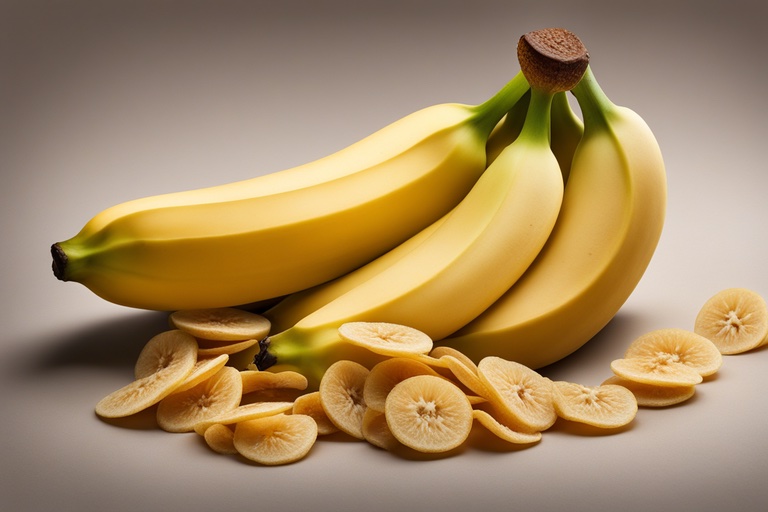Internet Asks: "Banana Chips Nutrition Facts"
Crispy, sweet, and undeniably moreish, banana chips have become a popular snack choice for many. But as we munch away these delightful golden slices, a question often pops up – are banana chips actually healthy? Let's peel away the myths and facts to uncover the nutritional truth about banana chips.
sponsored links

What are Banana Chips?
Typically, banana chips are made by slicing bananas and deep-frying them in oil. Some are baked, and most are sweetened with sugar or honey and flavored with spices like cinnamon or nutmeg.
Basic Nutrition Overview
-
- Caloric Content:
- Banana chips are more calorie-dense than fresh bananas due to the added oils and sugars in the frying process. A typical serving (about 1 ounce or 28 grams) can contain approximately 150 calories.
-
- Fat:
- Due to being deep-fried, they contain a significant amount of fat. This serving size may include about 10 grams of fat, depending on the brand and preparation method.
-
- Carbohydrates:
- Expect about 15-20 grams of carbohydrates per serving, largely due to added sugars and the natural sugars in bananas.
-
- Fiber:
- While fresh bananas are a good source of dietary fiber, banana chips contain less, typically around 1-2 grams per serving.
-
- Protein:
- Banana chips are not a significant source of protein, offering about 1 gram per serving.
-
- Vitamins and Minerals:
- While fresh bananas are known for their high potassium content, banana chips contain less, with around 150-200 mg per serving. However, they still provide some level of these nutrients, along with magnesium and iron.
-
- Sugar and Sodium
- Many commercial banana chips are sweetened, adding to their sugar content. Some flavored varieties might also have added salt, increasing their sodium content.
Health Considerations
- 1. High in Saturated Fats: Many banana chips are fried in oils containing high levels of saturated fats.
- 2. Added Sugars: The added sugars increase the calorie content and can impact blood sugar levels.
- 3. Lower in Nutrients: Compared to fresh bananas, the chips are lower in most vitamins and dietary fiber.
sponsored links
Healthy Eating Tips
- - Portion Control: Due to their high calorie and fat content, it’s wise to consume banana chips in moderation.
- - Reading Labels: Look for brands with lower added sugars and no added preservatives.
- - As Part of a Balanced Diet: Combine them with nuts and seeds for a more balanced snack.
Healthier Alternatives
- - Baked Banana Chips: These contain less fat and calories compared to the fried version.
- - Homemade Banana Chips: Making banana chips at home using a dehydrator or oven can allow for better control over the oil and sugar used.
Conclusion
Banana chips can be part of a balanced diet when consumed in moderation. While they provide some nutritional benefits, they are not a substitute for fresh bananas, especially considering their higher calorie and fat content. Being mindful of portion sizes and choosing less processed varieties can help you enjoy this snack without compromising your nutritional goals.
Disclaimer: This article is for informational purposes only. It is not intended as health or nutritional advice. Consult a dietitian or healthcare provider for advice tailored to your personal health needs.
sponsored links
References
1. Harvard T.H. Chan School of Public Health - The Nutrition Source: Bananas. https://www.hsph.harvard.edu/nutritionsource/food-features/bananas/
2. American Heart Association. Dietary Sugars and Cardiovascular Health. https://www.ahajournals.org/doi/full/10.1161/CIRCULATIONAHA.109.192627
3. USDA. FoodData Central. Snacks, banana chips. https://fdc.nal.usda.gov/fdc-app.html#/food-details/168849/nutrients
4. British Health Foundation. 10 "healthy" snack mistakes you're making. https://www.bhf.org.uk/informationsupport/heart-matters-magazine/nutrition/guide-to-healthy-snacks/snack-mistakes-youre-making#:~:text=Banana%20chips,also%20usually%20have%20sugar%20added.
5. Harvard T.H. Chan School of Public Health. Added Sugar. https://www.hsph.harvard.edu/nutritionsource/carbohydrates/added-sugar-in-the-diet/
People are also reading...
Why do Bananas Give Me Heartburn?
Banana pH?
Banana Face Mask
Banana Color
Substitute for Bananas
How to Order Matcha at Starbucks
Matcha Latte Calories
Does Sprite Have Caffeine?
Calories In Steak?
Ready to level-up?
Create meal plans 10x faster, follow up with your clients through our mobile app, and never struggle with meal planning or recipe management again.